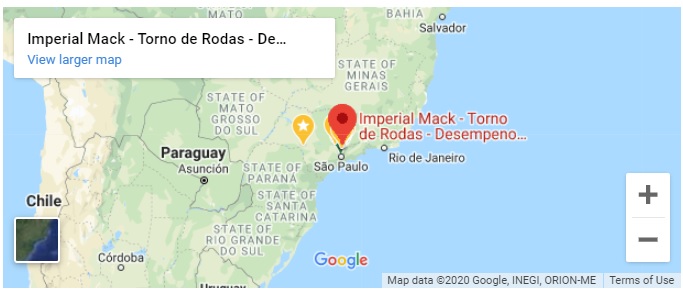Our Patented Technologies
Wheel repair lathes, IMPERIALMACK and the technology developed, improved and added to them are protected by the Industrial Property Law 9.279/96 (Patent Law).
Our Patented Technologies
The wheel repair lathes, IMPERIALMACK, and the technologies developed, improved, and added to them are protected by the Industrial Property Law 9.279/96 (Patents Law).
Reproduction, in whole or in part, is prohibited under current legislation. Offenders will be subject to civil and criminal consequences as provided by law.
Industrial Property Law 9.279/96
TITLE V CRIMES AGAINST INDUSTRIAL PROPERTY
CHAPTER I CRIMES AGAINST PATENTS
Art. 183. Commits a crime against a patent for invention or utility model anyone who:
I – manufactures a product that is the subject of a patent for invention or utility model without the authorization of the holder; or
II – uses a means or process that is the subject of a patent for invention without the authorization of the holder.
Penalty – detention, from 3 (three) months to 1 (one) year, or a fine.
Art. 184. Commits a crime against a patent for invention or utility model anyone who:
I – exports, sells, exhibits, or offers for sale, has in stock, conceals, or receives, for use for economic purposes, a product manufactured in violation of a patent for invention or utility model or obtained by a patented means or process; or
II – imports a product that is the subject of a patent for invention or utility model or obtained by a patented means or process in the country, for the purposes provided for in the previous item, and which has not been placed on the foreign market directly by the patent holder or with his consent.
Penalty – detention, from 1 (one) to 3 (three) months, or a fine.
Art. 185. Supplying a component of a patented product or material or equipment to perform a patented process, provided that the final application of the component, material, or equipment necessarily induces the exploitation of the object of the patent.
Penalty – detention, from 1 (one) to 3 (three) months, or a fine.
Art. 186. The crimes in this Chapter are characterized even if the violation does not affect all the claims of the patent or is restricted to the use of means equivalent to the object of the patent.
CHAPTER II CRIMES AGAINST INDUSTRIAL DESIGNS
Art. 187. To manufacture, without the authorization of the holder, a product incorporating a registered industrial design or a substantial imitation that may mislead or confuse.
Penalty – detention, from 3 (three) months to 1 (one) year, or a fine.
Art. 188. Commits a crime against the registration of an industrial design anyone who:
I – exports, sells, exhibits, or offers for sale, has in stock, conceals, or receives, for use for economic purposes, an object that incorporates an illicitly registered industrial design or a substantial imitation that may mislead or confuse; or
II – imports a product incorporating an industrial design registered in the country, or a substantial imitation that may mislead or confuse, for the purposes provided for in the previous item, and which has not been placed on the foreign market directly by the holder or with his consent.
Penalty – detention, from 1 (one) to 3 (three) months, or a fine.
…
Art. 207. Regardless of criminal action, the injured party may bring civil actions that it considers appropriate in accordance with the Code of Civil Procedure.
Art. 208. Compensation will be determined by the benefits that the injured party would have obtained if the violation had not occurred.
Art. 209. It is reserved to the injured party the right to claim for losses and damages in compensation for damages caused by acts of violation of industrial property rights and acts of unfair competition not provided for in this Law, tending to harm the reputation or business of others, to create confusion between commercial, industrial establishments or service providers, or between products and services placed on the market.
§ 1. The judge may, in the case of an imminent risk of irreparable or difficult-to-repair damage, order, in the same action, the suspension of the violation or of the act that causes it, before the defendant is summoned, through, if deemed necessary, a cash bond or surety bond.
§ 2. In cases of reproduction or blatant imitation of a registered trademark, the judge may order the seizure of all merchandise, products, objects, packaging, labels, and others containing the counterfeit or imitated trademark.



